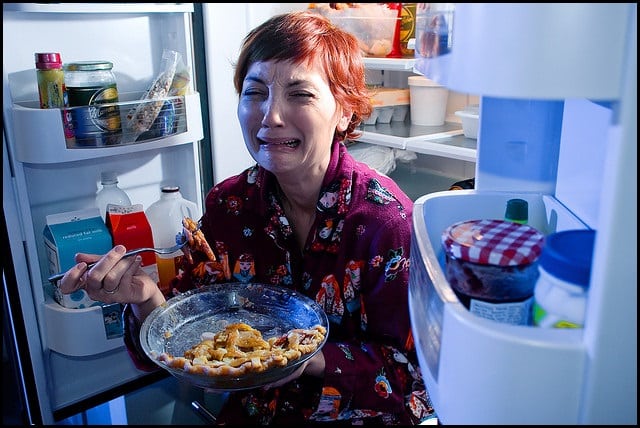A new paper, Treatment of Child/Adolescent Obesity Using the Addiction Model: A Smartphone App Pilot Study, will appear in the next print edition of the journal Childhood Obesity. This publication signals another advance in spreading the idea of using the addiction approach as a treatment for child/adolescent obesity. It’s mostly about the W8Loss2Go program, whose basic points Childhood Obesity News has covered in the past.
The paper’s authors were Robert A. Pretlow, MD, MSEE, FAAP; Carol M. Stock, JD, MSN; Stephen Allison, MBBS, FRANZCP; and Leigh Roeger, PhD.
Dr. Pretlow says his team hoped…
…through a process evaluation, to identify potential moderators of treatment effect as well as to better understand the most appealing and useful elements to children and adolescents of an addiction-based obesity intervention delivered through youth-popular smart phone technology.
Such a device can help very much with things like figuring out the necessary math. The excessive food amounts withdrawal stage, which takes three months, requires lessening the amounts eaten at mealtime by small increments.
Obesity and Self-Blame
Pilot studies of the smartphone app begin and end with a self-reporting questionnaire, which includes the question, “Does calling overweight/obesity an addiction affect your guilt or self-blame about your weight?” Participants answer that the A-word makes the guilt worse, better, or makes no difference. About half of the participants said “worse.” In a similar vein, participants also rated whether the addiction model approach used in the program had caused their guilt about being overweight to increase.
The subject of addition guilt is very germane to the program’s goal, and may even be an area it is dangerous to leave underexplored. Many years ago, Doreen Virtue suggested in her book Constant Craving that guilt about eating is the mind admitting to itself that the hunger is purely emotional, and not physiologically real. In the W8Loss2Go pilot studies, Dr. Pretlow has learned that participants who felt addiction guilt had poorer results in attempting to lose weight. Conversely, those who were not made to feel guiltier by the addiction model did better.
Gender Differences in Weight Loss
Dr. Pretlow’s team also learned that girls are more likely than boys to report that they experience addiction guilt. 66.7 percent of the girls admitted to it, against only 11.1 percent of the boys. The third pilot study turned up “the same findings on this question but not as dramatic…,” with 43 percent of females and 25 percent of males.
A vital thing to remember about addiction guilt is that it’s far more likely to be a problem that comes up during recovery, rather than during active addiction. The reason is not far to seek—any bad feeling can be smothered with the substance of abuse. New Life Recovery Program has this to say:
You may wonder why there is guilt and shame after overcoming your addiction..
Seek professional help to deal with the guilt and shame…
Make right your wrongs by seeking forgiveness of those closest to you. Remaining clean and sober is the greatest tool you have to repair the damage caused in active addiction.
Once you can truly forgive you, succeeding in recovery is so much easier.
Rev. Al Rosenblum adds:
When we lose control of our will to an outside force, it exposes our inner weakness causing guilt and shame. The guilt and shame from our addiction causes an increased need for comfort driving us back to the addiction. When we enter into an addiction, we create a self-perpetuating cycle… that feeds itself.
We hate what we are doing but believe we need it to comfort us from the overwhelming pain of hopelessness.
A friend of the W8Loss2Go project makes this suggestion:
If there is a way to make females see “addiction” as a reduction of guilt, then resistance to addiction-based therapeutic techniques might decrease. Is there some education around the term “addiction” that would help females in particular understand that
1) their overweight is not their fault and,
2) since it’s a addiction, it can be beaten — there is hope.
To which Dr. Pretlow replies,
“Hope” is a good idea, as many obese young people feel hopeless to do something about their overeating/obesity.
Your responses and feedback are welcome!
Source: “Treatment of Child/Adolescent Obesity Using the Addiction Model: A Smartphone App Pilot Study”, Liegertpub.com
Source: “How To Deal With Post Addiction Guilt And Shame,” newliferecoveryprogram.com, 10/13/11
Source: “Addictions, The Guilt & Shame Cycle,” go2grow.org, 2009
Image by Kevin McShane


 FAQs and Media Requests:
FAQs and Media Requests: 











